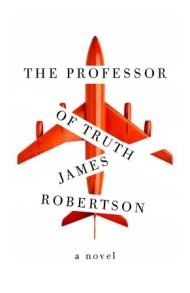Books |
The Professor of Truth
James Robertson
By
Published: Oct 02, 2013
Category:
Fiction
James Salter in Conversation: Frank Delaney, an Irish novelist who has such the gift for gab that I shut up and just listen, goes one-to-one with James Salter on Thursday night at the Irish Arts Center in New York. Should be pure delight.
—-—
Lockerbie.
The name of that small town in Scotland should be all you need to recall what happened there.
If you need more to jog your memory, try this: Pan Am 103.
Yes, that.
Just before Christmas of 1988, a half hour into the Pan Am 103 flight from London to New York, an explosion shredded the plane, killing all 243 passengers, 16 crew members and 11 people in a Scottish village. There were 89 Americans on that plane; until 9/11, it was the deadliest terror attack against the United States.
Who did it? In 2001, Abdelbaset al-Megrahi — from Libya — was convicted. According to the evidence presented at trial, the bomb was put in a suitcase that was loaded on a plane in Malta. It went to Frankfurt, then London, and then….
Who gave that evidence? A man from Malta. Just one man. But it was enough.
Jim Swire, an English doctor whose daughter was a passenger on Pan Am 103, didn’t buy it. He made a cause out of not buying it. He even went to see Abdelbaset al-Megrahi in jail.
Disconcerting, don’t you think? Because if al-Megrahi didn’t get a bomb-laden suitcase onto the plane, who did? If he didn’t do it, how involved were the police in creating the testimony that convicted him? And how many other cases are also “solved” in order to protect some “national interest” we know nothing about?
It’s a great set-up for a drama, and Joseph Robertson, a Scottish novelist, jumped all over it in “The Professor of Truth.” In his story the 28-year-old wife and 6-year-old daughter of Alan Tealing, an English professor at a college in Scotland, died in that plane bombing. Tealing goes numb: "That was the point: not to think about it. Just to do things, to get through the waking hours and the hours that were supposed to be for sleep, was all." Eighteen years later, he’s still mourning, still numb, still alone.
Well, not quite. Khalil Khazar has been convicted of the bombing, largely because of the testimony of one witness. Professor Tealing never believed that narrative. For all these years, he’s been working on “The Case,” a mass of research that, taken together, makes the government’s case against Khazar look bogus. Other families have found “closure.” Tealing has found a cause.
One snowy afternoon Tealing has a visitor, an American intelligence officer who uses a name that’s probably fake. He’s ill, dying of cancer. Before he dies, he wants Tealing to have a piece of information that just might help him prove the government convicted the wrong man. And that’s all I should say about the plot, lest I spoil the fraught pleasure of reading the novel. [To buy the paperback from Amazon, click here. For the Kindle edition, click here.]
I make it sound as if “The Professor of Truth” is a nail-biter. That’s not quite accurate. Everything about the bombing is thrilling and heartbreaking — especially the set pieces about the week after the crash, which put you inside Tealing’s horror and grief.
But this is also a meditation on the tension between justice and truth. By the second half of the book, when Tealing drops everything to seek the truth, morality and action get very tangled. And then you get passages like: “This cause goes beyond all of us. It even goes beyond Emily and Alice and the other people on that flight. Beyond us all there is something else worth reaching for, greater than any of us."
I’m an impatient person. Sometimes, when we go to a busy restaurant and our waiter is clearly overtaxed, I’ll ask for the check when we order — why lose precious minutes of your life waving in vain for your waiter’s attention at the end of the meal? “The Professor of Truth” reminded me how impatient I am. Conversations end, and then they keep going. We get a guided tour of thoughts that are in a kind of spin cycle.
I know just enough of grief to get that Robertson’s descriptions are psychologically acute. But I’m more interested in the story, and although I woke up at 3 AM to finish the book, I also found myself skimming.
At the end, I thought what I so often do: At 317 pages, this almost terrific book is 40 pages too long. How I wish someone had hired me to do some modest surgery. The novel would have cut like butter, and this four-star novel would have been a red hot, politically sharp five-star thriller.


